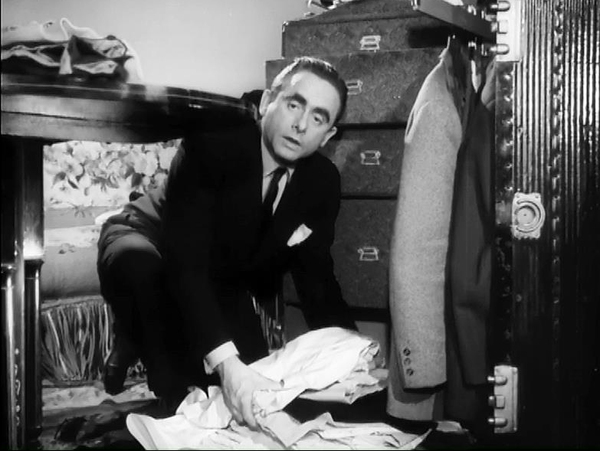The life and work of an oversensitive man
PostED ON TUESDAY, OCTOBER 17, 2017
Pierre-Henri Gilbert immediately rose to the challenge of removing this unfortunate and recurring label that persists of the great filmmaker; namely the reputation of a despot and a tyrant who, in his own words, had permanently "cannibalized his legacy.”

H.G Clouzot in « Brasil », 1950
Without forgetting to mention very personal and radical methods of directing actors (his companion of a time, Suzy Delair, would later confess: "We were all beaten, but it was for the best!"), we are reminded that this explains nothing of the fundamental options of this genius of evil. Indeed, these anecdotes of filming, sometimes peddled with a self-satisfied relish by the press, hungry for sensationalism, must not overshadow the profound humanity of his work. This is therefore the challenge before us in this hour of fruitful analyses. The other aspect judiciously put forward, is the formal modernity that traverses all the films of Clouzot who cares about reflecting the era for more than three decades. In passing, P.H. Gilbert reminds us that, long before the new wave, Clouzot was often perceived as a tyrannical figure, but no one asked other questions: "Is kindness a cinematographic quality? Was Kubrick a super nice guy? What about Bresson?” he says mischievously.
The idea of the master, according to our speaker, was that the camera only serves tp record and certainly cannot compensate. If there is to be a tension transmitted to the screen, it must be created on the set. We thus understood that it is a question of an absolute quest for authenticity. Not a sadistic temptation. Besides, Brigitte Bardot would be the first to claim she never acted more on point as when under the finicky eye of the filmmaker.
What identifies Clouzot the man as well as his work, Pierre-Henri Gilbert tells us, are three types of anguish. First, comes economic anguish: at the beginning of his professional life, he must not only provide for his own needs but also withstand the renewed solicitations of a forever desperate father. This fear of decline permeates his work, from The Murderer Lives at Number 21 to The Wages of Fear or The Spies. The other source of anguish, quite naturally, is death.
An extremely fragile health since childhood undoubtedly contributed to his dark character, but he will know, to our great happiness, how to channel this anguish into work. From this evil that gnaws at him, Clouzot will develop a kind of permanent distance from the things he will write down when shooting The Truth: "I'm scared. How important is a film, more or less? In the absolute, I am not able to go further than a little song. Where does this need to produce come from? Reputation, money, self-esteem, perhaps? But it is very secondary. I can work on The Truth and eat little until the end of my days. Poverty may have frightened me, but I do not really fear it anymore, so it may be a trick to stop thinking about anything. I’m afraid that this need to produce is only a way of forgetting my anguish. One always comes back to the same point; what am I doing here if the world has no meaning.” There is the third type of anguish that inhabits him, "In the absolute; I am not able to go further than a little song...". Referring to his past as a music hall composer, he seems to be on a permanent quest for legitimacy and, concerned about excellence, only sees his involvement in the cinema as a permanent penalty for bringing him to the pinnacle.*
Never satisfied with himself, having no confidence in the intuition of the first draft, he constantly erased and multiplied takes. Francois Truffaut, who did not write foolish nonsense, once said to him: "Your problem, my dear Henri-Georges, is that you want to make your best film, the best film of the year and the best film in the history of French cinema!”
Pierre Collier
* The origin of this expression can be found in the Catholic religion. The temple of Solomon is in Jerusalem, where Jesus was tempted by the devil, who put him to the test by telling him to go up to the pinnacle, to the top of the edifice, and throw himself into the void. The expression "bring to the pinnacle," and the notion of demonic temptation have disappeared. Today, the idea of a pinnacle, is a summit where a lauded person would be carried.

